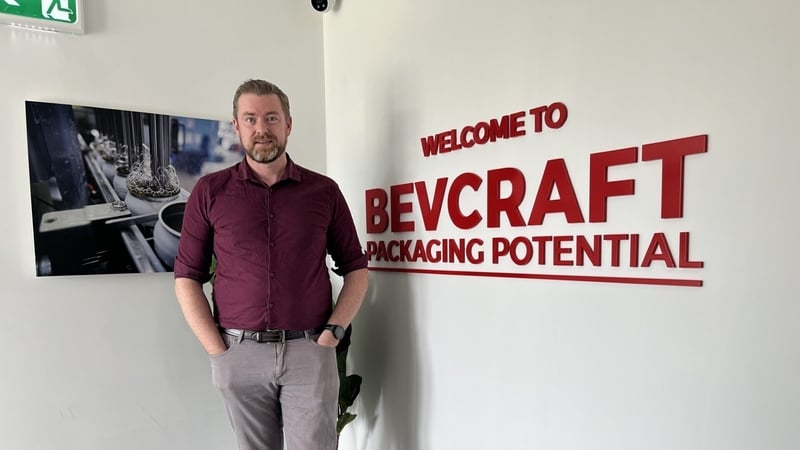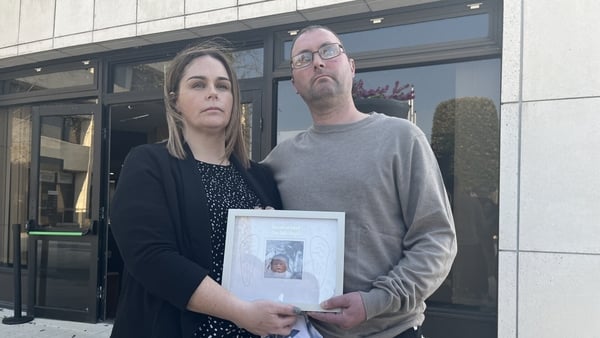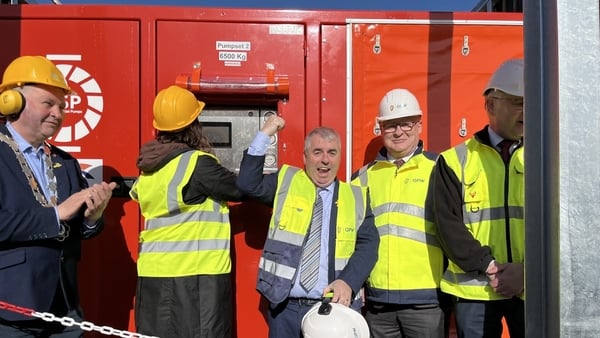Behind the doors of an industrial unit in Mullingar, Co Westmeath, they are planning for what might happen.
The owners of Bevcraft, a company which specialises in craft can packaging for the beverage sector, have been weighing up the potential threat of tariffs that look set to be introduced by US President Donald Trump.
They have already had some insight into the impact on trade because of their cross-border operations between the US and Canada.
"In January, we brought three million units across the border to sort of insulate that market but these are temporary measures, and now here in Europe, we're facing this next set of tariffs," explained Ciarán Gorman, Co-Founder and Chief Financial Officer of the group.
"We provide aluminium beverage cans to the craft beverage sector, and we operate in Ireland, the UK, Denmark, Norway and the Netherlands and we're working with small producers who are trying to export their product, in turn to international markets."
However, they know they are not alone and many companies across the country are concerned about what lies ahead.
"We don't just want to end those relationships."
"There's not a business in this town or in the country that doesn't have some impact or potential impact from tariffs," said Mr Gorman.
"We live in a globalised world and supply chains are global.
"We're in packaging, specifically, and I think there's no business that doesn't use packaging."
Mr Gorman explained their concerns are cost-based driven.
"Aluminium is a double commodity. It's traded across borders. It's produced across borders," he said.
"Any sort of material impact from tariffs on the underlying cost of it is going to feed through to consumer levels, and in turn, that's going to squeeze the producers who are producing product in the middle, and, of course, profitability within each sector."
We need your consent to load this rte-player contentWe use rte-player to manage extra content that can set cookies on your device and collect data about your activity. Please review their details and accept them to load the content.Manage Preferences
Stockpiling only serves as a short-term measure, says Gorman
However, Mr Gorman acknowledges stockpiling or getting ahead of the order book is only a short-term measure.
"Trade is like water. It's fluid," he said.
"It has to go to where the least barriers are and ultimately we'll have to look at our supply chain, where we source things we work with, and so on."
"Our American partners have been fantastic over the years, so it's frustrating to have to do that," he added.
"I think over the last number of years, we've spent about $20 million with American companies.
"They're manufacturing companies sustaining jobs in the US. These are innovative companies. We use them for a reason."
"We don't just want to end those relationships," he said.
"We have to find a way of working with them and in their case, they might invest in Europe to support command here."
Concerns about potential impact of tariffs on customers
The owners of Bevcraft, which employs 20 people at its Westmeath base and 40 more across Europe, the US and Canada also have concerns about the potential impact of tariffs on their clients or customers.
"A large portion of our customer base here in Ireland are in the alcohol sector and are exporting quite a bit across to the US, in particular, the whiskey sector, but also beer," explained Darren Fenton, Co-Founder and Chief Operating Officer.
"If that product is subject to a 200% tariff, it's hard to know how things are going to pan out for those clients and there's definitely a level of concern and apprehension over that."
The midlands in particular has a high concentration of pharmaceutical companies.

It also has a significantly higher concentration of people employed in manufacturing than the national average.
Many of the companies are working together to try to assess the possible damage.
Among the groups working with businesses is the Advanced Technologies in Manufacturing Cluster.
With over 70 members spanning engineering, polymer, food and drink, medical devices, and technology solutions, it acts as a bridge between industry, academia, and government to accelerate innovation and enhance competitiveness.
"We work with companies, big and small right across the manufacturing value chain from MedTech companies to companies in the food and beverage sector as well as polymer companies," explained Caitriona Mordan, Manager of the Advanced Technologies in Manufacturing Cluster in the midlands.
"Predominantly the concerns are around the unknowns, they don't know what's coming down the tracks, the details are not crystal clear and the timing piece is very pressing and imminent too."
"I suppose with Brexit, it was very much a staged approach.

"This is coming thick and fast. Companies are brilliant, but we're entering unprecedented territory here," she said.
"There's jobs on the line, and where there's these tariffs and they're added to what is quite a tight margin already, there's potential for companies to go out of business," Ms Mordan added.
Exploring opportunities in other markets
Last week, almost 30 companies attended a workshop online where concerns were discussed.
"We create these collaborative spaces for companies to understand what information is coming down the line and how we can work together to really respond to that as a collective," said Ms Mordan.
"We're involved with European projects at the moment too, looking at building more resilient European supply chains as well, that includes where we're getting our materials from, but also where we're selling to as well."
Read more: World stock markets fall ahead of Trump's tariff deadline
Ms Mordan said there are opportunities in other markets.
"We are a registered cluster with the European Commission, so we have that kind of understanding of what our companies actually want, but also a collective voice that we're able to raise at levels at European Commission.
"For example, there's a lot of talk in those forums now about how we reposition our European companies to engage with Canadian clusters and Japanese clusters.
"So we're at the forefront of all of that and we''ll try to support the members here in the Midlands to engage with those potential opportunities coming down the line."
Back at Bevcraft in Mullingar, they will be keeping a close eye on developments in the US tomorrow.
"Absolutely we'll be watching it," said Mr Fenton.
"Will things get kicked out by another week, another month? I think that's quite possible, but we just have to wait and see and adapt as necessary."





